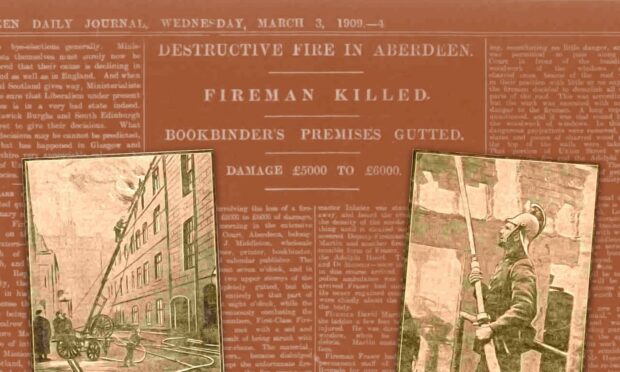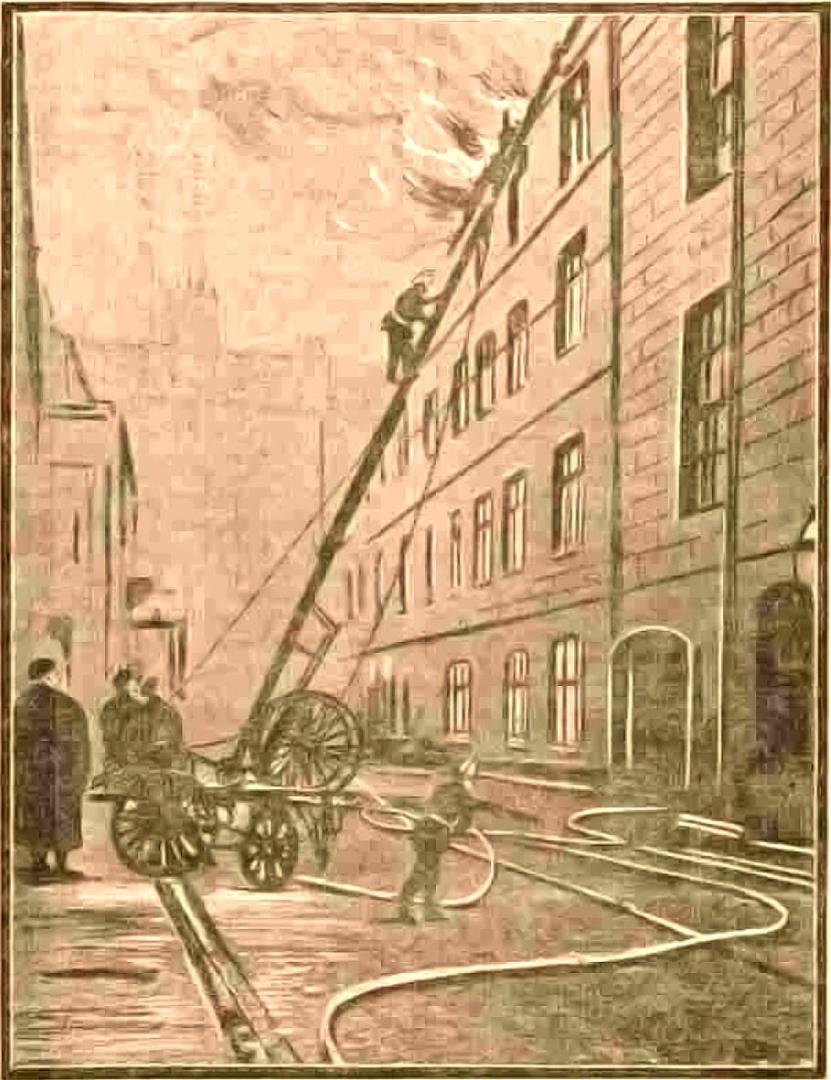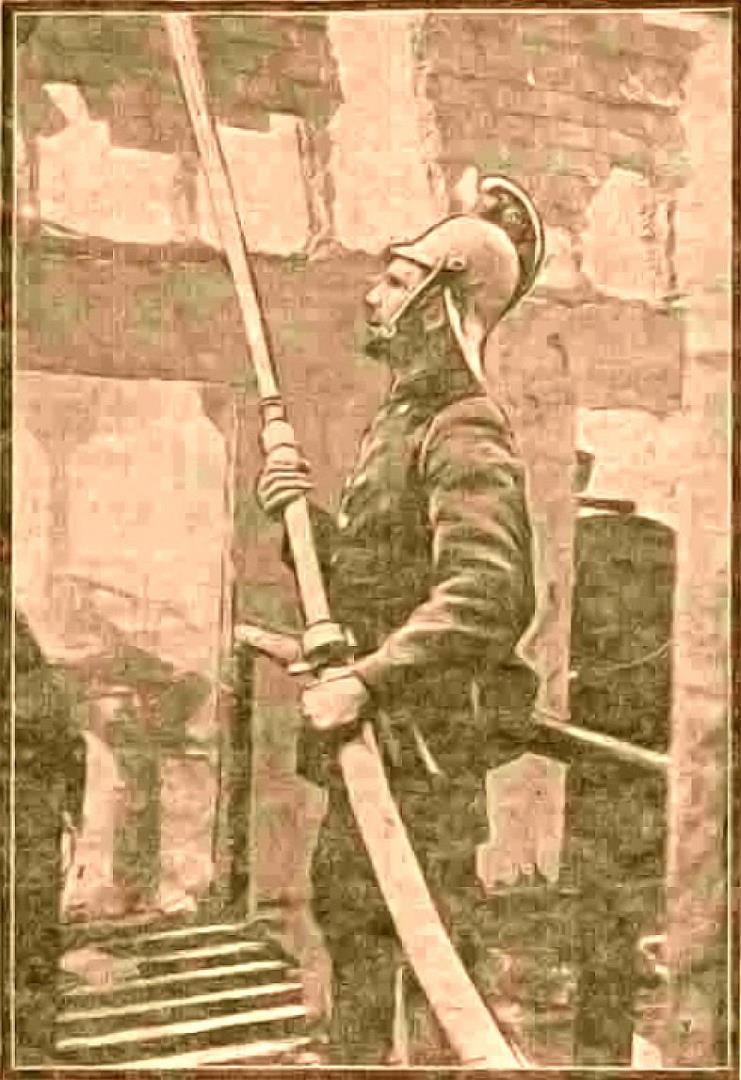He was the hero Aberdeen firefighter who died in the line of duty while battling a devastating warehouse blaze on March 2 1909.
Now, as plans for a permanent memorial to honour William Armstrong Fraser will ensure his bravery and sacrifice is never forgotten, testimonies from those who witnessed his final moments can be revealed today from our archives.
The 28-year-old was struck by a rone pipe that knocked him off a ladder while fighting the blaze at a bookbinder’s premises in Adelphi Court.
His final words were to warn his colleague of impending danger.
Here was a hero to the very last.
How did the fire start?
A postman on his rounds raised the alarm after the fire broke out in the fourth floor of the five-storey building where cardboard boxes were manufactured.
Firefighters arrived at 7am on March 2 1909 to find the two top floors already well alight and a ladder was brought into operation that extended up 55 feet.
Mr Fraser was working at the top of the ladder to direct water from the hose into the burning building and his colleague David Martin was immediately below him.
The Aberdeen Journal reported: “When the brigade arrived shortly after seven o’clock, the magnitude of the outbreak was immediately grasped, the number of large business premises in the neighbourhood at once raising fears of a destructive conflagration.
“From the hydrants in both Union Street and Adelphi Court, an abundant flow of water was kept pouring on the flames, and the dense volumes of smoke created the greatest alarm in the neighbourhood.
“About eight o’clock, while the fire brigade were strenuously combating the flames, one of their members, First Class Fireman William Fraser, met with a sad and sudden death as the result of being struck with a heavy piece of water rone.
“The material, weighing over one cwt., became dislodged from the roof, and swept the unfortunate fireman from his position on the fire escape – on which he had been at work – to the ground, a distance of nearly 40 feet.”
Final goodbye
Several pieces of wood and part of a heavy metal rone that was four feet long were found beside Mr Fraser, who died 10 minutes after being struck.
Thousands of people lined the route and parts of Aberdeen were brought to a standstill when Mr Fraser was laid to rest at Trinity Cemetery on March 5 1909.
A fire engine drawn by four black horses and guarded by four members of the Aberdeen City Fire Brigade carried the coffin from his home in St Clair Street.
The Aberdeen Journal reported: “In the vicinity of the fire station and St Clair Street, the congregation of people was largest, but as the procession formed and proceeded on its way out King Street, a clear space was immediately opened up, and the cortege was received at every point with evidences of deep respect and sympathy.
“The blinds of dwelling-houses and business premises were drawn down and the male section of the crowd reverently uncovered their heads as the coffin passed on its red carriage, and surrounded by the deceased’s comrades, whose gleaming helmets and polished accoutrements imparted a picturesque touch to the solemn scene.”
The last fire brigade funeral was in 1887 when Alexander Booth died in somewhat similar circumstances.
A fatal accident inquiry was then held on March 11 1909 before Sheriff Laing and a jury into the circumstances surrounding the death of Mr Fraser in Adelphi Court.
Firefighter David Martin was on the ladder with Mr Fraser when the rone fell from the roof and gave testimony of his colleague’s final moments before he died.
He said they were about 15 feet from the rone and 30-40 feet from the ground.
Last words
Mr Martin was asked what happened next?
He replied: “Fraser told me: ‘Don’t look up here – the glass will fall on your face’.
“I turned my face down for fear of being struck with the glass on the face, and I heard a crash. I clung to the ladder with one hand, and still held on to the hose.
“I was not aware of Fraser falling off the ladder. I looked up and saw he was missing. I heard the woodwork of the window give way and fall.
“I think it was the woodwork that struck me.
“I went down at once to see about my companion, and discovered that he had been carried into the Adelphi Hotel. I was able to continue my work, and shortly afterwards heard of his death from the effects of the injuries sustained in the fall.
“I was scratched about the neck and face but not seriously. When I was standing on the escape, my head was on a level with the deceased’s knees.
“Fraser did not fall straight down – he must have been knocked off the ladder. When Fraser was on the escape, he required both hands to use the nozzle.
“He had nothing to hold on by. Fraser did not fall from the ladder accidentally.
“Something struck him and knocked him off.”
Deputy Firemaster Pollock said everything seemed perfectly safe and there was nothing to suggest the rone pipes or the woodwork of the windows were about to fall.
While the men were fighting the fire in dense smoke, Mr Pollock said he heard a noise and saw something fall to the south side of the ladder.
When the smoke cleared he could see Mr Fraser being picked up. He went to assist Mr Fraser, who was unconscious.
Accidental death
Mr Alexander Low, a fancy box maker, broke it down further.
He said part of a rone and a considerable amount of woodwork collapsed and struck Mr Fraser between the shoulder and the neck. He fell off the ladder and made two somersaults before he reached the ground.
So far as he observed, the whole affair was an accident.
The sheriff said he thought the jury would come to the conclusion that Mr Fraser’s death was unfortunate and nothing could have prevented the accident.
The jury had no difficulty in arriving at the decision that his death was due to a pure accident following the description given by Mr Low.
Mr Fraser’s sacrifice will be etched into the fabric of Aberdeen with plans now being advanced for a Red Plaque at Adelphi Court to mark his sacrifice.
More like this:
How Strathburn School in Inverurie rose again after being destroyed by fire in February 2001


